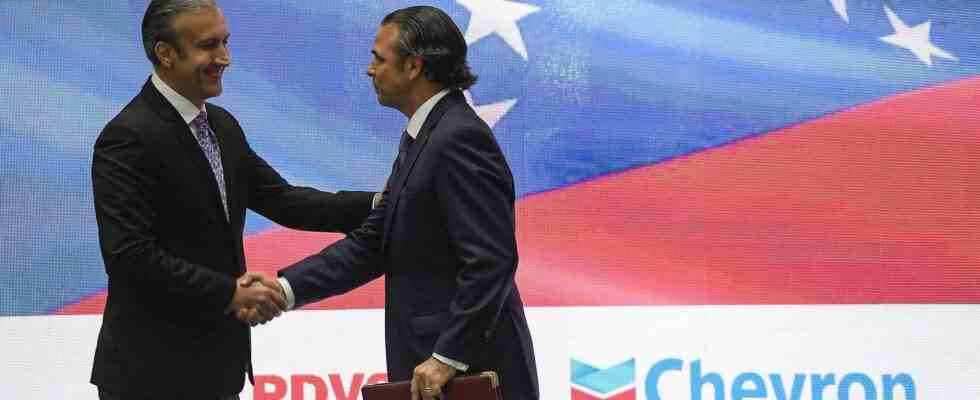Status: 12/14/2022 6:02 p.m
In small steps, the USA and Venezuela are getting closer again. This enables an agreement on oil production and oil sales. The new pragmatism has little to do with Venezuela itself – and is subject to reservations.
Venezuela’s Oil Minister Tareck El Aissami and the President of the American oil company Chevron in Venezuela, Javier La Rosa, shake hands – a symbolic picture at a press conference in early December. Chevron is allowed to resume oil production and sales in Venezuela after US sanctions are eased.
The Venezuelan economist Asdrúbal Olivero attributes this to a changed “international context”. The Russian invasion of Ukraine “changed the whole panorama – both for the Europeans and for the USA”.
Washington is counting on Venezuela taking this step away from Russia’s sphere of influence. This is also important because of the geographical proximity of both countries – and because of the oil wealth.
Rich in oil – and yet ailing
Venezuela is one of the most oil-rich countries in the world. But many of the production facilities are idle. The technology is ailing. The South American country has never set up sufficient cash reserves for the necessary maintenance of the systems.
However, despite the sanctions, Chevron has carried out work over the past few years, says Victor Alvarez of the Central University in Caracas.
Chevron has defied repeated threats from former President Donald Trump that the US would permanently withdraw from the country. The company received a number of maintenance licenses that enabled Chevron to protect its investments in the country.
The oil company will be able to increase its current operating capacity from around 110,000 barrels to a total of around 235,000 barrels in the short and medium term – to supply the US market.
An agreement that is limited in time
The license currently granted to Chevron is initially only valid for six months and can be revoked at any time. That depends on the progress made in talks between Nicolás Maduro’s Venezuelan government and the opposition, Washington said.
The United States broke off diplomatic relations with the authoritarian Venezuelan President after his controversial re-election in 2018. The United States repeatedly tightened sanctions against him and recognized opposition leader Juan Guaidó as interim president.
As a result, the United States had to import more oil from Russia.
What is the effect of the war in Ukraine?
In view of the energy crisis triggered by the war in Ukraine, the government of US President Biden is now making a significant step towards Maduro, according to Álvarez.
The Biden administration has an interest in the conflict in Venezuela being resolved through proper elections as soon as possible, as the Republicans in the US Congress would not allow doing business with a government that the US does not recognize, Álvarez explains:
The US government must normalize diplomatic and commercial relations with Venezuela, which can only be done with a government elected in a transparent manner and according to international standards.
Just a first step?
Talks between the opposition and Nicolás Maduro’s government are currently taking place in Mexico. The easing of sanctions is a first step and could lead to further successes, said Asdrúbal Olivero.
This includes more economic growth, an improvement in the human rights situation and more political freedoms. None of this can be said in Venezuela at the moment.
In addition, Maduro’s style of government entails risks – and also the time limit on the concessions. But, according to Olivero, they might have to be addressed.
One thing is certain: With the global energy crisis, Maduro has gained negotiating leeway.

